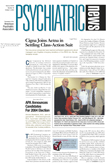Aripiprazole (Abilify) appears to be both a safe and effective treatment for acute mania associated with bipolar disorder, according to data published last month. Aripiprazole, the first third-generation antipsychotic offers a novel mechanism of action—dopamine/serotonin system stabilization—not shared by any other medication.
A Supplemental New Drug Application for Abilify for the treatment of acute mania submitted by Bristol-Myers Squibb and Otsuka Pharmaceuticals is pending review by the Food and Drug Administration (FDA). Abilify was approved by the FDA in November 2002 for treatment of patients with schizophrenia; last month it won approval for maintaining stability in patients with schizophrenia (see story on
page 36.)
The new report, which appeared in the September Psychiatric Services, details one of four company-funded clinical trials conducted with aripiprazole in patients with bipolar disorder. The current study was led by Paul E. Keck Jr., M.D., a professor of psychiatry, pharmacology, and neuroscience and vice chair for research at the University of Cincinnati College of Medicine, on behalf of the Aripiprazole Study Group. Three of those trials compared aripiprazole with placebo, and the fourth compared it with an active control (haloperidol). In all, the data represent aripiprazole treatment in more than 1,100 patients with bipolar disorder.
Significant Improvement
In three of the trials patients showed significantly more improvement with aripiprazole, while the fourth did not show a statistical difference, due largely to a high placebo-response rate, according to BMS/Otsuka.
Of note, it has become more common recently to see clinical-trials data published more quickly following submission of the data to the FDA, whereas in the past, it was often years before clinical-trials data submitted to the FDA as part of a proprietary application was published. The current AJP report is the first of the four trials to be published.
Keck and colleagues from 38 centers across the United States compared aripiprazole with placebo in 262 adults with bipolar I disorder, manic or mixed episode, who were experiencing an acute relapse that required hospitalization. Patients were randomly assigned in a double-blind manner to either 30 mg a day of aripiprazole or placebo. The dose of aripiprazole during the study could be reduced to 15 mg a day, if needed for tolerability concerns. The study lasted three weeks.
All patients remained in the hospital for the first two weeks and could be discharged at the third week if they met criteria for improvement. Patients who had not responded by the end of week two were discontinued from double-blind treatment and offered the option of continuing in an open-label study of aripiprazole.
By the end of the study, aripiprazole produced highly significant, robust improvements in patient scores on the Young Mania Rating Scale (an improvement of 8.2 points for aripiprazole, compared with 3.4 points for placebo) and on the Clinical Global Impression–Severity of Illness scores (a decrease in severity of 1 point with aripiprazole compared with 0.4 points with placebo). Improvements were statistically significant with aripiprazole compared with placebo by day four of the three-week study.
A similar number of patients in both groups discontinued the study due to adverse events (14 taking aripiprazole, 13 taking placebo). Serious adverse events were reported for four patients from each group during treatment or in the 30 days after treatment. Serious events in the group taking aripiprazole included manic reaction, psychiatric decompensation, overdose with sedatives, and hypertension (one case each). Patients taking placebo reported agitation, accidental injury, chest pain, and hives (one case each).
Adverse Events
Common adverse effects that occurred in patients taking aripiprazole at a significantly elevated rate compared with placebo included nausea, dyspepsia, vomiting, constipation, somnolence, anxiety, and akathisia. Dose reduction or discontinuation due to akathisia was rare. Patients in both groups lost a small amount of weight (0.8 kg for placebo, compared with 0.3 kg for aripiprazole).
No elevations in prolactin were noted, and over the course of the study, prolactin levels decreased in the aripiprazole group significantly more than in those taking placebo. No differences were seen between placebo and aripiprazole on electrocardiograms, vital signs, or laboratory analyses.
Psychiatr Serv 2003 54 1282
